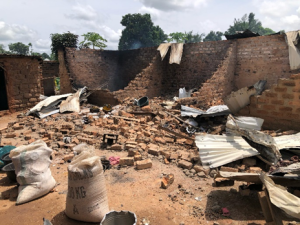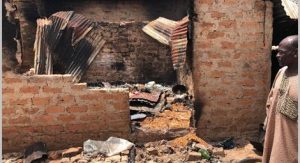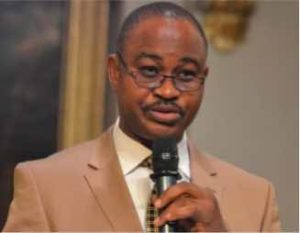 On the night of Friday 13 June, armed Muslim Fulani militants attacked sleeping Christians in Yelewata in the Makurdi region of Benue state in Nigeria’s Middle Belt.
On the night of Friday 13 June, armed Muslim Fulani militants attacked sleeping Christians in Yelewata in the Makurdi region of Benue state in Nigeria’s Middle Belt.
The victims were Internally Displaced People (IDP) who had sought safety and shelter in Yelewata after being forced from their homes and lands in previous violence. The Catholic charity Aid to the Church in Need (ACN) reported that “the IDP families were in buildings repurposed as temporary accommodation in the market square in Yelewata when the militants stormed in, shouting ‘Allahu Akhbar’ (‘God is great’), before killing people at will. They reportedly used fuel to set fire to the doors of the displaced people’s accommodation, before opening fire in an area where more than 500 people were asleep.”
ACN also reported that local Catholic clergy said that earlier the same evening police had repelled the attackers as they tried to storm Yelewata’s St Joseph’s Catholic Church, where up to 700 IDPs lay sleeping. It is understood that the initial attack happened at around 10pm while the later fatal attack on IDPs in the market square lasted from 11pm to 1am.
Father Ukuma Jonathan Angbianbee (the parish priest of Yelewata), told ACN how the attack on St Joseph’s Church unfolded: “When we heard the shots and saw the militants, we committed our lives to God. This morning, I thank God I am alive.” Father Jonathan said he and others identified the attackers as Fulanis and that the attack was carefully coordinated, adding that the militants accessed the town from multiple angles and used the cover of heavy rain to mount their assault. He said: “There is no question about who carried out the attack. They were definitely Fulanis. They were shouting ‘Allahu Akhbar’.” Police protecting the church were able to stop the militants but were unable to prevent the attack on the IDPs in the nearby market place.
 Father Jonathan described visiting the market square on the morning after the attack: “What I saw was truly gruesome. People were slaughtered. Corpses were scattered everywhere. Some were so badly burned it was difficult to identify them.”
Father Jonathan described visiting the market square on the morning after the attack: “What I saw was truly gruesome. People were slaughtered. Corpses were scattered everywhere. Some were so badly burned it was difficult to identify them.”
He explained that Yelewata had absorbed thousands of IDPs from neighbouring villages as it was considered relatively safe, lying on the main road to Abuja. However, following the attack, IDPs hurried to leave the town.
ACN reported that the attack followed an increase in attacks in the Makurdi region, which is more than 95 percent Catholic.
Barnabas Fund quoted two survivors of the attack. A village elder named as Moses said, “It was like a war. In my 57 years on earth, I’ve never witnessed this. I escaped with my third son. My wife and other children were not so lucky. My world ended that Friday night.” Another survivor, Tsegba Lucy, lost her mother and five siblings after their home was set ablaze by the gunmen. “My beloved mum and beautiful sisters,” she cried. “Go well till we meet again. I love you, but God loves you more.”
Mass Funeral
On Monday 16 June, the bodies of over 120 victims of the massacre were laid to rest in a mass burial In Yelewata. The bodies of many other victims remained in the mortuary, awaiting identification.
Naira Diary TV reported that “The atmosphere in the community was filled with sorrow, grief, and unanswered questions as families mourned their loved ones in one of the darkest moments in Benue’s recent history. Entire households were wiped out in the coordinated attack, leaving behind pain, silence, and shattered dreams.”
Reaction
 Reverend Yunusa Nmadu (CEO of Christian Solidarity Worldwide Nigeria) said: “It’s unfortunate that Benue, once touted as the food basket of the nation, is grappling with hunger due to the inability of its people to till their farms. I urge the federal government to, as a matter of urgency, move from mere rhetoric and perfunctory condemnation to a sincere, committed, and single-minded determination to halt the killings not only in Benue but in other states across the nation, which are bleeding from the menace of armed herdsmen.”
Reverend Yunusa Nmadu (CEO of Christian Solidarity Worldwide Nigeria) said: “It’s unfortunate that Benue, once touted as the food basket of the nation, is grappling with hunger due to the inability of its people to till their farms. I urge the federal government to, as a matter of urgency, move from mere rhetoric and perfunctory condemnation to a sincere, committed, and single-minded determination to halt the killings not only in Benue but in other states across the nation, which are bleeding from the menace of armed herdsmen.”
Speaking at the Angelus in the Vatican on Sunday 15 June, Pope Leo said he was praying for those “brutally killed” in “a terrible massacre”, most of them IDPs “sheltered by the local Catholic mission”. He said he was praying for “security, justice and peace” in Nigeria, adding that in his thoughts especially were the “rural Christian communities of the Benue State who have been relentless victims of violence”.
The President of Nigeria, Bola Tinubu, travelled to the region on Tuesday 17 June and visited some of the injured, including some children, in a local hospital. Earlier, he had posted on X: “I have been briefed on the senseless bloodletting in Benue State. Enough is enough! I have directed the security agencies to act decisively, arrest perpetrators of these evil acts on all sides of the conflict, and prosecute them. Political and community leaders in Benue State must act responsibly and avoid inflammatory utterances that could further increase tensions and killings. This is the time for Governor Alia to act as a statesman and immediately lead the process of dialogue and reconciliation that will bring peace to Benue. Our people must live in peace, and it is possible when leaders across the divides work together in harmony and differences are identified and addressed with fairness, openness and justice.”
On Wednesday 18 June, the United States Commission on International Religious Freedom reiterated its call for the U.S. Department of State to designate Nigeria a Country of Particular Concern in the light of the weekend’s attack in Benue State. Chair of the Commission Vicky Hartzler said “The abhorrent violence in Nigeria’s Middle Belt and the systematic, ongoing, and egregious attacks throughout Nigeria against Christians and Muslims are indications that government prevention efforts are failing and not protecting vulnerable religious communities.”
(Aid to the Church in Need, Barnabas Fund, Christian Solidarity Worldwide, International Christian Concern, Naira Diary TV)
Image Credits: Christian Solidarity Worldwide
